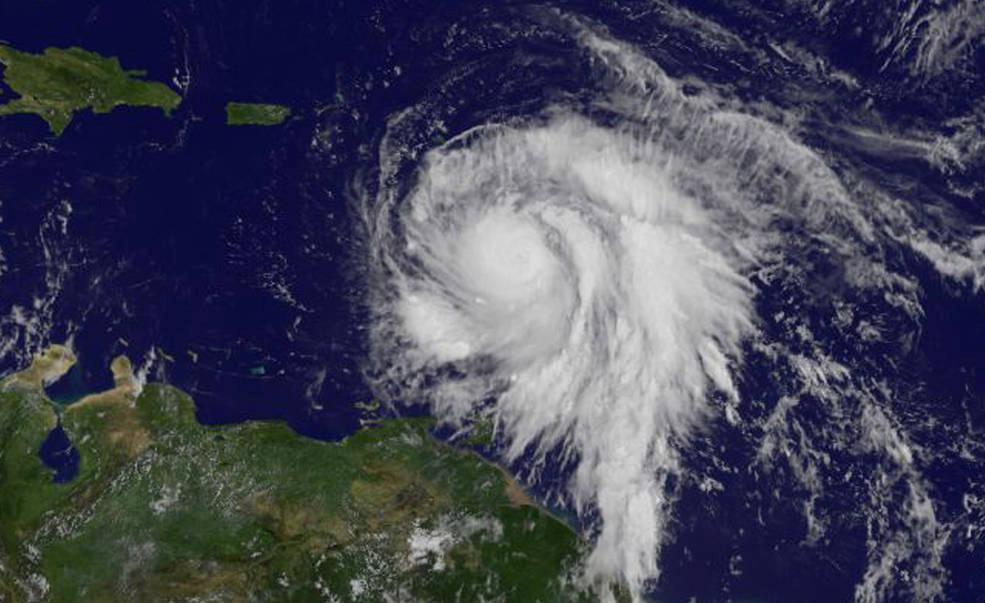Leaders in Dominica describe ‘widespread devastation’ from Hurricane Maria
Hurricane Maria is shown in the Atlantic Ocean in this satellite photo as it strengthened to a Category 3 hurricane just east of the Leeward Islands at 10:45 a.m. EDT on Sept. 18, 2017.
Hurricane Maria smashed into the eastern Caribbean island of Dominica on Tuesday, with its prime minister describing devastating damage as winds and rain from the storm also hit territories still reeling from Irma.
Maria, which has been fluctuating in intensity between a Category 4 and Category 5 hurricane on its path through the Caribbean, hit Dominica with winds of up to 160 mph, the US National Hurricane Center (NHC) said.
"We have lost all what money can buy and replace," Dominica Prime Minister Roosevelt Skerrit posted on Facebook, saying there were initial reports of "widespread devastation".
"My greatest fear for the morning is that we will wake to news of serious physical injury and possible deaths as a result of likely landslides triggered by persistent rains."
Earlier, he said his roof had been blown off and house flooded, leaving him "at the complete mercy of the hurricane".
After being rescued, Skerrit appealed for "help of all kinds" but noted specifically that authorities would need helicopters to survey the damage.
Dominica's airport and ports have been closed.
After moving across the tropical island of 72,000 people, Maria churning north towards the British Virgin Islands and Puerto Rico.
The British archipelago, which is still mopping up after Hurricane Irma earlier this month, has been under curfew since Monday, with residents ordered to stay indoors until after the storm, which is expected to hit Wednesday.
"Our islands are extremely vulnerable right now," the territory's premier Orlando Smith said in a statement, warning that the storm could turn debris left by Irma into dangerous projectiles.
The NHC warned Maria would "remain extremely dangerous" as it passed over the British and US territories.
'Everything shaking'
The French territory of Guadeloupe — the bridgehead for aid for Irma-hit French territories — found itself in the eye of the storm on Tuesday.
Heavy rain lashed the island and several areas were without power.
"Everything around me is shaking," a former French minister told BFMTV channel from his home in the south of the 400,000-strong island, which was on maximum-level "violet" alert.
French Interior Minister Gerard Collomb said 110 more soldiers would be deployed to the region to reinforce about 3,000 people already there shoring up security, rebuilding infrastructure and distributing aid after Irma.
He warned of "major difficulties" if Guadeloupe was hard hit.
The Dominican Republic, whose east coast was battered by Irma, ordered citizens in part of the north to evacuate ahead of Maria's arrival.
St. Kitts, Nevis, the British island of Montserrat, Culebra and Vieques are also on alert.
Martinique, a French island south of Dominica, suffered power outages but avoided major damage.
Preparing for the worst
Criticized for the pace of relief efforts in their overseas territories devastated by Irma, Britain, France and the Netherlands said they were boosting resources for the Caribbean.
"We are planning for the unexpected, we are planning for the worst," said Chris Austin, head of a UK military task force set up to deal with Irma, as the British Virgin Islands readied for a new onslaught.
On the island of St. Martin, which is split between France and the Netherlands, authorities announced a red alert ahead of Maria's arrival.
"We're watching its trajectory very closely, and we're preparing for the worst-case scenario," said local official Anne Laubies.
The Dutch navy tweeted that troops were heading to the two tiny neighbouring islands of Saba and St. Eustatius to ensure security following widespread complaints after the first hurricane of looting and lawlessness on St. Martin, among the worst hit by Irma, with 14 killed.
Hurricane series
Irma left around 40 people dead altogether in the Caribbean before churning west and pounding Florida, where the death toll stood at 50 Monday.
It broke records when it whipped up winds of at least 183 mph for more than 33 hours straight.
Another hurricane, Jose, is also active in the Atlantic and has triggered tropical storm warnings for the northeastern United States.
Many scientists are convinced that megastorms such as Irma, and Harvey before it, are intensified by the greater energy they can draw from oceans that are warming as a result of climate change.
We want to hear your feedback so we can keep improving our website, theworld.org. Please fill out this quick survey and let us know your thoughts (your answers will be anonymous). Thanks for your time!
